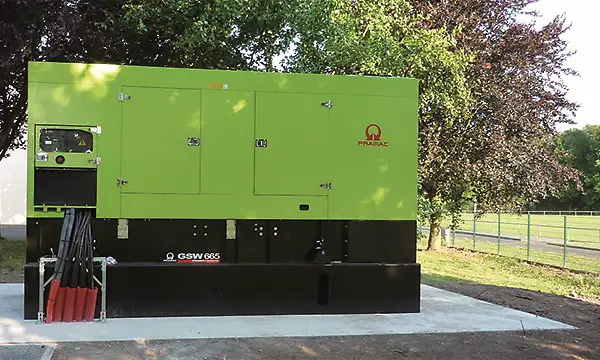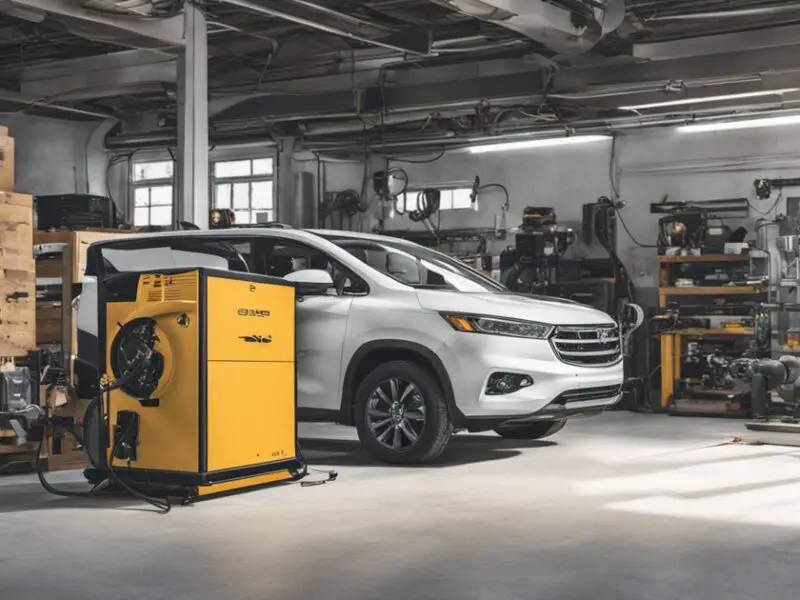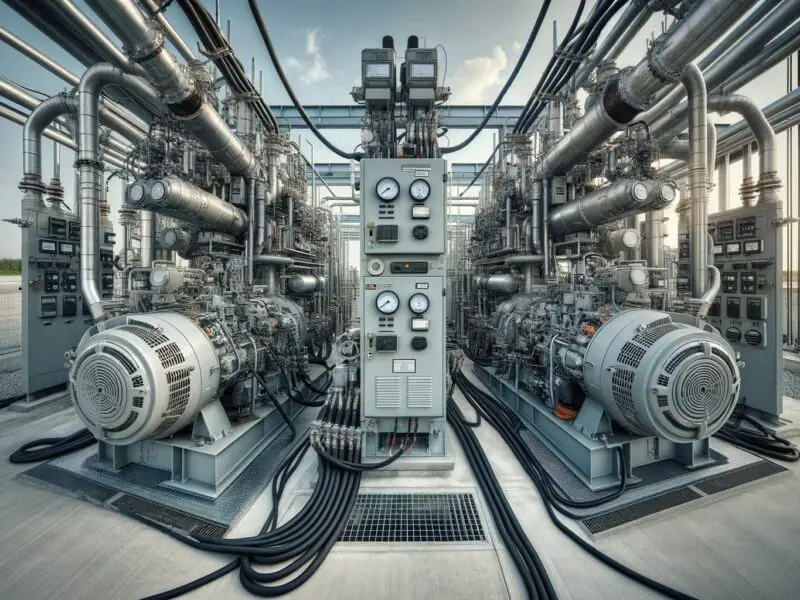
- Wind Turbines
- Green Hydrogen
- Hybrid Power Solutions
- Energy Storage Systems
- Government Initiatives for Cleaner Energy
- Expert Advice for Transitioning to Green Energy
- Natural Gas Use & Supply for Generators
- FAQs
- FAQ 1: What are some fuel alternatives for generators?
- FAQ 2: Why should I consider using propane as a fuel alternative for my generator?
- FAQ 3: Is natural gas a viable option as a fuel alternative for generators?
- FAQ 4: What are the benefits of using biodiesel as a fuel alternative for generators?
- FAQ 5: Can I power my generator with solar energy?
Are you tired of relying on traditional generator fuel and looking for a green alternative that is sustainable and environmentally-friendly? Consider home generators powered by alternative energy. Looking for a clean and sustainable alternative to power your generators? Consider using fuel cells instead of fossil fuels to reduce fuel consumption and lower fuel costs. Solar power is an alternative energy source that is here to revolutionize the way we generate electricity in our homes. With the increasing popularity of alternative fuel sources, home generators powered by solar energy are becoming a viable option for many households. These generators provide a clean and sustainable alternative to fossil fuel generators, reducing our reliance on non-renewable resources. Harnessing the energy of the sun, solar power offers an alternative fuel source and eco-friendly solution to fossil fuel generators for home generators.
With photovoltaic (PV) panels converting sunlight into usable electricity, solar power provides an efficient and reliable source of energy. Additionally, solar power can be stored in a battery for later use, making it a convenient alternative source of energy. Furthermore, solar power can also be used to power a home generator, serving as an alternative fuel source. Say goodbye to fossil fuels and hello to a greener future with hybrid power solutions. These innovative systems combine battery technology with traditional power sources, reducing carbon emissions and promoting sustainability. Embracing hybrid power systems is the key to a cleaner and more environmentally friendly future. Whether you need backup power during outages or want to reduce your carbon footprint, solar generators, powered by alternative fuel sources and equipped with energy storage batteries, are the answer for those seeking alternative sources of energy.
From understanding how solar panels work to discovering their applications in powering various devices, get ready to embrace a cleaner and more sustainable way of generating electricity using alternative sources such as battery and energy storage.
Wind Turbines
Wind turbines are a fantastic alternative. These towering structures capture the power of the wind and convert it into electrical energy that can be used to power homes, businesses, industries, and even entire communities. Unlike diesel generators, wind turbines generate electricity without relying on fossil fuels, making them a sustainable alternative for powering various sectors including mining. Let’s take a closer look at how wind turbines, as alternative sources of energy, work and why they are an eco-friendly option for our energy needs. Hybrid power systems and hybrid power solutions are playing a crucial role in the transition towards sustainable energy.
Capture Wind Energy
The primary function of wind turbines is to harness the kinetic energy present in the wind for mining operations and convert it into usable electrical power, facilitating the transition of industries. The hybrid power turbine blades, which resemble giant propellers, rotate as the wind blows, facilitating the transition to clean energy storage in various industries. This rotational motion sets the hybrid power generator in motion, producing electricity for mining solutions during the transition. It’s like having a massive hand-crank generator powered by Mother Nature herself, providing solutions for mining and transitioning to a sustainable home.
Eco-Friendly Power Generation
One of the most significant advantages of wind turbines is their eco-friendliness in transitioning to hybrid power solutions for homes. Unlike traditional power plants that rely on fossil fuels like coal or natural gas, wind turbines provide a solution for the transition to clean and renewable energy by generating electricity using wind energy. By harnessing hybrid power, we can transition and reduce our dependence on non-renewable fuels. This transition will decrease harmful greenhouse gas emissions that contribute to climate change.
Reliable Power Source
In addition to being environmentally friendly, wind turbines offer a reliable source of power during the transition to sustainable energy. While other forms of renewable energy may be intermittent or dependent on specific weather conditions, wind power can provide a consistent supply of electricity as long as there is sufficient wind. This reliability is particularly valuable in areas prone to frequent power outages or where access to traditional grid infrastructure is limited.
Benefits for Communities
Wind turbines have numerous benefits for both individuals and communities at large, especially when it comes to harnessing hybrid power.
- Reduced Energy Costs: Using wind power can help lower electricity bills for residents and businesses alike.
- Job Creation: The development and maintenance of hybrid power wind farms create employment opportunities within local communities.
- Increased Energy Independence: Relying on renewable sources like wind energy and hybrid power reduces dependence on imported fuels and increases energy self-sufficiency.
- Support for Local Economy: Wind farms can bring economic benefits to rural areas by providing lease payments to landowners and tax revenue to local governments. Additionally, the implementation of hybrid power systems can further boost the local economy.
Drawbacks and Considerations
While wind turbines offer many advantages, it’s essential to consider their drawbacks as well, especially when it comes to hybrid power.
- Location Dependence: Wind turbines require specific locations with consistent wind patterns, which may limit the feasibility of hybrid power in some regions.
- Visual Impact: The large size of hybrid power wind turbines and their rotating blades can be visually intrusive, impacting the scenic beauty of certain landscapes.
- Noise Concerns: Hybrid power wind turbines produce a low level of noise during operation, which could potentially disturb nearby residents if located too close to residential areas.
Green Hydrogen
Green hydrogen is a game-changer. It is produced by using renewable energy sources, such as wind or solar power, to electrolyze water and separate hydrogen from oxygen. This process results in a clean and sustainable fuel that can be used to power generators without emitting harmful carbon emissions into the atmosphere.
One of the significant advantages of green hydrogen is its minimal impact on the environment. When burned, it only releases water vapor, making it an excellent choice for reducing carbon footprints and combating climate change. Unlike traditional fossil fuels like gas or diesel, which contribute to greenhouse gas emissions and air pollution, green hydrogen offers a carbon-neutral solution for powering generators.
The use of green hydrogen as a fuel alternative for generators has several benefits:
Clean Energy Source
Green hydrogen is derived from renewable energy sources, making it an environmentally friendly option for powering generators. By utilizing wind or solar power to produce hydrogen, we can reduce our reliance on fossil fuels and decrease our carbon emissions significantly.
Versatility
Green hydrogen can be used in various applications beyond generator fuel. It can serve as a source of energy for transportation, heating systems, and even industrial processes. Its versatility makes it an attractive option for transitioning towards a more sustainable future.
Energy Storage Solution
One of the challenges with renewable energy sources like wind or solar power is their intermittent nature. Green hydrogen provides a solution by acting as an efficient means of storing excess energy generated during periods of low demand. This stored energy can then be utilized later when there is high demand or when renewable energy generation is limited.
Scalability
As technology advances and economies of scale improve, the production of green hydrogen becomes more cost-effective. This scalability allows for larger-scale deployment across industries and regions, facilitating the transition towards cleaner energy systems on a global scale.
While green hydrogen presents numerous advantages as a generator fuel alternative, there are also some challenges to consider:
Production Costs
Currently, the production of green hydrogen is more expensive compared to traditional fossil fuels. However, as technology advances and economies of scale are achieved, the costs are expected to decrease over time.
Infrastructure Development
To fully harness the potential of green hydrogen, significant investments in infrastructure are required. This includes the development of electrolysis plants, storage facilities, and distribution networks. The establishment of a robust infrastructure network is crucial for widespread adoption and utilization of green hydrogen.
Hybrid Power Solutions
Hybrid power solutions are a game-changer. These systems combine multiple renewable energy sources, such as solar and wind, with conventional generator systems to create efficient and sustainable power options.
Optimized Efficiency
One of the key advantages of hybrid power solutions is their ability to optimize efficiency by utilizing different energy sources based on availability and demand. For example, during sunny days, solar panels can generate ample electricity, reducing the reliance on traditional generator fuel. On the other hand, when sunlight is limited or at night, wind turbines can pick up the slack and provide clean energy. This dynamic approach ensures that power generation remains consistent while minimizing the consumption of non-renewable resources.
Reliable and Sustainable
Hybrid power solutions offer reliable and sustainable alternatives to solely relying on generator fuel. By incorporating renewable energy sources into the system, they reduce greenhouse gas emissions and environmental impact significantly. This not only helps combat climate change but also promotes a cleaner and healthier planet for future generations.
Cost-Effective Options
In addition to being environmentally friendly, hybrid power systems can also be cost-effective in the long run. While initial installation costs may be higher compared to traditional generators alone, the savings come from reduced dependence on expensive fossil fuels over time. With renewable energy becoming more affordable and accessible, businesses and individuals can benefit from lower operational costs while making a positive impact on the environment.
Versatile Applications
Hybrid power solutions have versatile applications across various industries and settings. They can be used in remote areas where access to grid electricity is limited or unreliable. For instance, in off-grid locations or during natural disasters when traditional infrastructure fails, these systems provide a lifeline by ensuring continuous power supply through renewable sources.
Furthermore, hybrid power solutions are ideal for mobile setups like construction sites or events that require temporary electricity supply without relying solely on generators running on fossil fuels.
Energy Storage Systems
Energy storage systems play a crucial role in ensuring a steady and reliable power supply, especially. These systems are designed to store excess electricity generated from renewable sources such as solar or wind energy. By storing this energy, they provide a backup power source for times when the renewable generation fluctuates or is unavailable.
Storing Renewable Energy Efficiently
One of the most common components used in energy storage systems is batteries. These batteries efficiently store the excess energy produced by renewable sources. They work by converting electrical energy into chemical potential energy, which can be released later to power generators when needed. This stored energy can then be used during peak demand periods or when there is no sunlight or wind available for generating electricity.
Ensuring Continuous Power Supply
The primary purpose of energy storage systems is to ensure a continuous power supply even when renewable generation fluctuates. This is particularly important for microgrid systems that rely heavily on renewable sources but still need a reliable backup option. By using an energy storage system, these microgrids can maintain stable operations without interruptions caused by variations in renewable generation.
Reducing Dependence on Traditional Fuel Sources
Energy storage systems also contribute to reducing our dependence on traditional fuel sources like gasoline, diesel, or natural gas. Instead of relying solely on these finite resources, we can harness the power of renewables and store it for future use. By doing so, we decrease our reliance on fossil fuels and move towards more sustainable and environmentally friendly alternatives.
Flexibility in Location Requirements
Another advantage of energy storage systems is their flexibility in location requirements. Unlike traditional generator setups that often require specific infrastructure and fuel delivery mechanisms, these systems can be installed virtually anywhere with proper connectivity to renewable energy sources. This makes them suitable for both urban and remote areas alike, providing reliable power regardless of geographical constraints.
Government Initiatives for Cleaner Energy
Governments worldwide are taking action to promote cleaner energy adoption and reduce reliance on traditional fuel sources for generators. These initiatives aim to encourage the use of alternative fuel sources and align with sustainability commitments. Let’s explore how governments are playing a crucial role in accelerating the transition towards cleaner generator fuel alternatives.
Subsidies and Tax Credits
One way governments support the shift towards cleaner energy is by providing subsidies and tax credits. These financial incentives encourage businesses and individuals to invest in green technologies such as solar or wind-powered generators. By offering financial assistance, governments make it more affordable for people to adopt these sustainable options.
- Pros:
- Subsidies and tax credits lower the upfront costs of purchasing renewable energy systems, making them more accessible.
- Financial incentives help offset ongoing operational expenses, reducing overall fuel costs.
- Increased adoption of clean energy technologies creates jobs in the renewable energy sector.
- Cons:
- Governments need to allocate funds for these subsidies, which can impact their budgets.
- The effectiveness of subsidies relies on proper implementation and monitoring.
Policy Frameworks
Governments also play a vital role in creating policy frameworks that prioritize clean energy usage. Through legislation and regulations, they establish targets for renewable energy generation and emissions reduction. By setting clear guidelines, governments provide a roadmap for businesses and individuals to follow when transitioning to cleaner generator fuel alternatives.
- Pros:
- Policy frameworks create stability in the market, giving investors confidence in long-term returns on clean energy investments.
- Clear guidelines help businesses plan their operations accordingly, ensuring compliance with environmental standards.
- Cons:
- Developing effective policies requires careful consideration of various factors such as economic impacts, technological advancements, and social acceptance.
- The implementation of policies may face resistance from industries heavily reliant on conventional fuel sources.
International Collaboration
Recognizing that climate change is a global issue, governments collaborate internationally to share knowledge, resources, and best practices. Through partnerships and agreements, countries work together to address common challenges and accelerate the adoption of cleaner generator fuel alternatives.
- Pros:
- International collaboration allows for the exchange of ideas and experiences, enabling governments to learn from successful initiatives implemented by other countries.
- Joint efforts can lead to the development of innovative solutions that benefit all participating nations.
- Cons:
- Different countries have varying priorities and approaches towards clean energy adoption, which can make it challenging to achieve consensus on certain issues.
- Coordinating international efforts requires effective communication and cooperation between governments with different political systems and cultural backgrounds.
Impact on Industries
Government initiatives for cleaner energy have a significant impact on various industries, including mining sectors. As governments tighten regulations around emissions and environmental standards, industries are compelled to explore alternative fuel sources for their generators. This shift not only reduces their carbon footprint but also helps them comply with evolving sustainability requirements.
Expert Advice for Transitioning to Green Energy
Transitioning to green energy is a smart move for both the environment and your wallet. But before you make the switch, it’s essential to consult with experts who specialize in renewable energy solutions. These professionals can provide valuable advice and guidance to ensure a smooth transition.
Consult with Renewable Energy Experts
There are numerous options available, such as solar power, wind energy, and biofuels. However, determining the most suitable option for your specific needs requires careful consideration of various factors. This is where renewable energy experts come in.
By consulting with these specialists, you can gain insights into which green energy source aligns best with your location, available resources, and energy requirements. They will assess your current setup and provide recommendations tailored to your unique circumstances. Whether you’re looking for an off-grid solution or want to supplement your existing power supply, their expertise will prove invaluable.
Consider Location and Available Resources
One crucial factor when transitioning to green energy is considering your location and the resources available to you. For instance, if you live in an area abundant in sunlight throughout the year, solar power might be an excellent choice for generating electricity. On the other hand, if you reside in a windy region near open spaces or coastlines, harnessing wind energy could be more feasible.
Consider whether you have access to biomass or biofuel sources that can be utilized as alternative fuels for generators. Understanding these factors will help determine which green energy option makes the most sense economically and environmentally.
Assess Energy Requirements
Before making any decisions about transitioning to green energy sources for your generator fuel supply, it’s vital to assess your energy requirements accurately. Evaluate how much power you need on a daily basis and during peak usage periods. This assessment will help determine the capacity of the renewable system required to meet your demands effectively.
By understanding your energy consumption patterns, you can avoid investing in an insufficient system or overspending on unnecessary capacity. Renewable energy experts can assist in conducting energy audits and providing accurate assessments to ensure you make an informed decision.
Regular Maintenance and Monitoring
Once you’ve transitioned to a green energy source for your generator fuel supply, it’s crucial to prioritize regular maintenance and monitoring. Renewable energy systems require ongoing care to ensure optimal performance and efficiency. This includes cleaning solar panels, inspecting wind turbines for any damage, and regularly servicing biofuel generators.
By staying proactive with maintenance tasks, you can prevent unexpected breakdowns and maximize the lifespan of your renewable energy system. Monitoring your system’s performance allows you to identify any issues promptly and take corrective measures.
Natural Gas Use & Supply for Generators
Now that we’ve explored various fuel alternatives for generators, let’s take a closer look at natural gas and its role in powering these machines. Natural gas has gained popularity as a cleaner and more efficient option compared to traditional fossil fuels. It burns cleaner, emitting fewer greenhouse gases and pollutants into the atmosphere. Natural gas is abundant and readily available, making it a reliable source of energy.
If you’re considering using natural gas for your generator, it’s important to ensure a steady supply. Connect with local utility companies or explore options for on-site storage to guarantee uninterrupted access to this fuel source. Remember, proper maintenance is crucial to keep your generator running smoothly and efficiently.
In conclusion, transitioning to cleaner energy sources for generators is not only an environmentally responsible choice but also a practical one. By harnessing the power of solar, wind, green hydrogen, or hybrid solutions alongside energy storage systems, you can reduce your carbon footprint while ensuring reliable power supply. Take advantage of government initiatives promoting cleaner energy adoption and seek expert advice tailored to your specific needs. Embrace the opportunity to make a positive impact on our planet by exploring these fuel alternatives for your generator today!
FAQs
FAQ 1: What are some fuel alternatives for generators?
There are several fuel alternatives you can consider for your generator. Some popular options include propane, natural gas, biodiesel, and solar power. Each alternative has its own benefits and considerations, so it’s important to choose one that suits your needs and preferences.
FAQ 2: Why should I consider using propane as a fuel alternative for my portable generator? Propane is a versatile fuel option that can be used with diesel generators, home generators, and gas generators.
Propane is a great fuel alternative for generators due to its numerous advantages. It burns cleaner than gasoline or diesel, which means less harmful emissions. Propane is also readily available and can be stored safely for long periods of time. Propane-powered generators tend to require less maintenance compared to other types.
FAQ 3: Is natural gas a viable option as a fuel alternative for power generation? Natural gas is one of the green alternatives for hybrid power solutions and hybrid power systems.
Yes, natural gas is an excellent choice as a fuel alternative for generators. It is widely available through existing utility pipelines, making it convenient and easily accessible. Natural gas is also considered cleaner burning compared to traditional fossil fuels like gasoline or diesel. However, keep in mind that the availability of natural gas may vary depending on your location.
FAQ 4: What are the benefits of using biodiesel as a fuel alternative for generators in hybrid power systems?
Biodiesel offers numerous benefits as a green alternative for generators in hybrid power solutions. By incorporating biodiesel into microgrid systems, businesses can reduce their carbon footprint and rely less on traditional fossil fuels.
Using biodiesel as a fuel alternative offers several advantages. Biodiesel is derived from renewable sources such as vegetable oils or animal fats, making it more environmentally friendly than conventional fuels. It reduces greenhouse gas emissions and contributes to lower carbon footprints. Furthermore, biodiesel can be used in existing diesel engines without any modifications.
FAQ 5: Can I power my home generators with solar energy? Can I power my portable generators with solar energy? Can I power my fossil fuel generators with solar energy? Can I power my gas generators with solar energy?
Absolutely! Solar power is an increasingly popular option for powering various appliances and devices, including generators. By harnessing the sun’s energy through photovoltaic panels or solar arrays, you can generate electricity that can be used directly by your generator or stored in batteries for later use. Solar power provides a clean and sustainable energy solution, reducing reliance on traditional fuel sources.
Remember, when choosing a fuel alternative for your generator, consider factors such as availability, cost, environmental impact, and compatibility with your specific generator model. Make an informed decision based on your needs and preferences. Don’t hesitate to consult experts or professionals in the field for further guidance.




